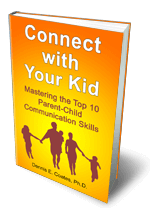I’ve written two books, Conversations with the Wise Uncle (for boys) and Conversations with the Wise Aunt (for girls) that are fictional accounts about an older relative mentoring a young person during the teen years to give the child a “heads up” about important issues.
The inspiration for these books came when one of my best friends told me about his teen years. When he was 12, his uncle took him out for breakfast. In addition to potatoes and eggs, they shared a long talk. His uncle was relaxed and fun to be with, not at all like his dad, who was stern, demanding and hard to talk to.
In a friendly, casual way, his uncle talked about what the boy could expect during his teen years. He described the physical changes that were about to happen to him as he matured into an adult. He talked about peer pressure, risk-taking behavior and the consequences of sex, drugs, and alcohol.
At the end of the talk, my friend’s uncle said, “Now I want you to promise me something. When your friends want you to go along with them and something inside you doesn’t feel right, I want you to stop and think about what could happen. I want you to remember the things we talked about. Will you do that?”
My friend told me this talk with his uncle was the most important conversation of his life, that it helped him steer clear of all kinds of trouble during his teen years. Not that he was a perfect kid, whatever that is. But most of the time when he was tempted to do something he knew he shouldn’t, and usually it was something fun or exciting, he remembered what his uncle told him. He said having an uncle who leveled with him about the consequences of bad decisions was the luckiest thing that ever happened to him.
Truthfully, kids don’t need a talk like this. The need lots of talks, about many issues, transacted piecemeal one opportunity at a time during moments when the time is right between parent and child. But many adults don’t feel comfortable talking to kids about these things. I know this because I’ve been engaged in a long-term anecdotal research effort, in which I ask adults about their teen years. I have yet to find another person who had anything like this “heads-up” talk when they were young. I know I didn’t. How about you? Were you one of the lucky ones?
Hence the inspiration to write this book – to suggest to parents what to talk about and how to talk about it. And if desired, to give the book to the teen to read as a supplement to these conversations.
But why is it that parents fail to talk to their kids about these things? Why are they reluctant to coach them about things like sex, peer pressure, and addictive substances? Here’s what I’ve come up with so far…
- Their own parents didn’t talk with them, so they don’t have that model to work from.
- Their memories of their own teen years are mixed and muddled.
- They aren’t sure what needs to be covered, what to say or how to go about it.
- They’re afraid they’ll get it wrong, give bad advice.
- Times have changed. Teens today face some new issues.
- It may be hard to get their teen to listen to what they have to say – the old “generation gap.”
These concerns are well-founded. Here are some issues today’s parents may not realize that teens need coaching and encouragement about…
- Teen brain development – awareness of the sensitive period for developing critical thinking skills
- Alcohol and drugs – how they can permanently derail developing this area of intelligence
- Life and death
- Faith and spirituality
- Learning and preparing for adult life
- How skills and habits are formed
- Why personal strengths are crucial to success and how to develop them
- Why communication skills are crucial to success and how to develop them
- Why working on personal development as a teen will give them a huge edge later in life
You can see why I wrote the Wise Aunt and Wise Uncle books. Even parents who would do anything to give their kids an edge to grow into happy, successful adults could feel inadequate to the challenge of coaching them in some of these areas.
 More truth-telling about parent-teen communication.
More truth-telling about parent-teen communication.
When having the many important talks, ideally you’ll engage strong communication skills. This book will help: Connect with Your Kid: Mastering the Top 10 Parent-Child Communication Skills.
You can grow the bond with your child through better listening. Download the FREE ebook, Listening to Understand.

